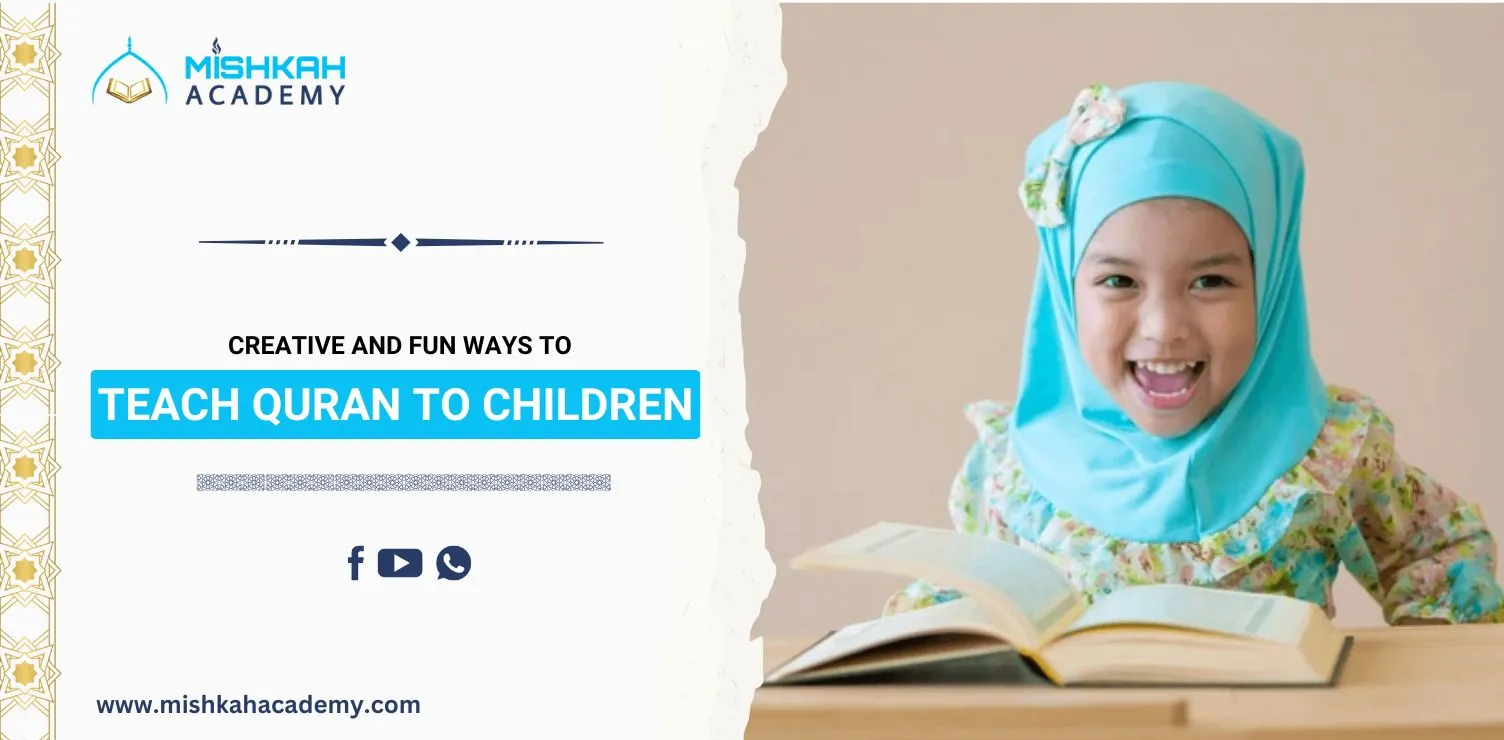Parents need fun ways to teach their kids the Quran because children learn best through engaging and enjoyable methods. Without these, it can be hard for kids to stay focused or excited about learning and memorizing.
Making Quran lessons interesting encourages children to develop strong reading, memorization, and understanding skills. Fun techniques like storytelling, flashcards, and creative memorization charts can help make the learning process easier. Using apps, fun games, by interactive methods, and enrolling in quran classes for kids keeps children motivated and involved. Teaching kids the Quran in a fun way ensures they grasp it better and enjoy learning every step.
10 Fun Ways to Teach the Quran to Children
Table of Contents
ToggleHere are some fun ways shared by Mishkah Academy quran tutors that are used in online quran classes for children to keep kids motivated and involved.
1. Use Stories of Prophets from the Quran to Spark Curiosity
Prophetic stories are a fun and engaging way to teach kids Quranic values. By narrating these stories in a playful and easy-to-understand manner, children learn important lessons and develop love for the Quran. Here’s a table of three prophets to focus on:
| Prophet Name | Story | Description |
| Prophet Nuh | Building the Ark | Teaches patience and trust in Allah. |
| Prophet Musa | Parting of the Sea | Highlights bravery and Allah’s miracles. |
| Prophet Yusuf | Journey from Prison to Power | Demonstrates faith and perseverance. |
2. Create Flashcards for Noorani Qaida Lessons
Flashcards are an easy and playful method to help kids master the basics of Arabic reading. These cards can feature letters, sounds, and small words from Noorani Qaida course, making the learning process engaging. Focus on specific lessons like:
- Lesson 1: The Arabic Alphabet – Create colorful flashcards with each letter and its pronunciation.
- Lesson 3: Harakat (short vowels) – Flashcards with each vowel symbol and its sound in combination with letters.
Using flashcards transforms learning into a fun game, helping kids love the process and easily retain what they’ve learned.
3. Use Hand Gestures or Actions to Aid Dua Memorization
Adding hand gestures to Quranic duas helps children memorize and understand the meaning in a fun and engaging way. Here are two examples:
Here are the duas in Quranic Arabic:
Dua for Knowledge (Surah Ta-Ha 20:114):
- رَبِّ زِدْنِي عِلْمًا
- Use hand gestures such as pointing to the head for “increase me in knowledge.”
Dua for Forgiveness (Surah Al-Baqarah 2:286):
- رَبَّنَا لَا تُؤَاخِذْنَا إِن نَّسِينَا أَوْ أَخْطَأْنَا
- Point to the heart when asking for forgiveness.
These duas can be easily memorized with simple hand gestures to make learning fun for kids.
4. Create Small Surah Memorization Charts
Surah memorization charts are a fun and engaging way to help kids track their progress and stay motivated. Create a colorful chart divided into sections for each verse, and let children color in or add stickers once they memorize a part.
For example, with Surah Al-Asr, you can use simple symbols like clocks to represent the theme of time. Break down each verse into manageable parts and use playful actions or drawings related to the meaning. This makes Quran memorization program easy and exciting for kids, while they love seeing their progress unfold visually.
5. Incorporate Quran-related Apps and Games for the Kid
Interactive Quran apps make learning playful and fun for children. Two great apps to try are:
- Quran for Kids: This app offers games like matching words to their meanings and audio lessons for easy memorization.
- Noorani Qaida by IqraTech: Engages children with lessons on Arabic alphabet and vowels, helping them love learning Quran basics in an interactive way.
These apps offer engaging, structured lessons and games that allow kids to learn at their own pace while enjoying the experience.
Start Your Quran Journey Now6. Play Audios of Quranic Recitation While Kids Engage in Activities
Listening to Quranic recitations while kids play or do daily activities builds familiarity with the Quran in a relaxed, fun way. Three recommended reciters for children include:
- Sheikh Mishary Rashid Alafasy
- Sheikh Saad Al-Ghamdi
- Sheikh Abdul Basit Abdul Samad
Start with short surahs like Surah Al-Fatiha and Surah Al-Ikhlas. This method keeps kids connected to the Quran effortlessly as they love the soothing sounds of the recitations.
7. Introduce Quranic Calligraphy
Quranic calligraphy is a playful and creative way for kids to develop a love for the Quran while improving their writing skills. Start with simple and commonly used words like:
- الله (Allah)
- الحمد (Alhamdulillah)
- محمد (Muhammad)
- سورة (Surah)
- قرآن (Quran)
Let children use colorful pens or paints to make the learning process fun. This hands-on activity enhances both their writing skills and Quranic understanding.
8. Indulge in Group Quranic Learning
Group learning is a fun and engaging way for children to memorize and understand Quran word by word. When kids learn together, they feel excited and motivated. Sharing the learning experience with friends or siblings creates a playful environment where they enjoy friendly competition and encouragement.
Children naturally love to mimic and learn from peers, which makes memorization easy and boosts confidence. Group Quranic sessions or hifz classes for kids can include reciting verses together, playing memorization games, and even acting out stories.
9. Take Time Out and Read the Quran with Them Daily
Family involvement is key to fostering a love for the Quran. When parents take time out to read the Quran with their children daily, it creates a strong family bond and encourages easy learning. Establishing a Quran reading schedule ensures consistency, making it easier for the entire family to engage in this spiritual practice together.
Research shows that children who spend quality time with their families are more likely to develop positive attitudes toward learning. Daily Quran reading becomes a cherished family activity, helping kids feel supported and loved.
10. Reward Your Kid When They Do Well
Positive reinforcement motivates children to continue learning the Quran with excitement and love. When kids achieve a milestone, rewarding them makes the process fun and encourages them to do more. Some engaging rewards include:
- Quranic storybooks to deepen their love for the Quran.
- Small toys or a favorite treat as immediate rewards.
- A Quran party with friends and family to celebrate their progress.
Conclusion
Making Quran learning fun and engaging is essential for children’s development. Incorporating playful activities, technology, and group learning can significantly enhance their experience.
While memorizing on your own is beneficial, having expert Online Quran tutors is invaluable. Mishkah Academy stands out as the best platform, offering a comprehensive Hifz course with experienced instructors who guide children through their Quranic journey, ensuring they progress effectively in their memorization.
Start Your Quran Journey Now





